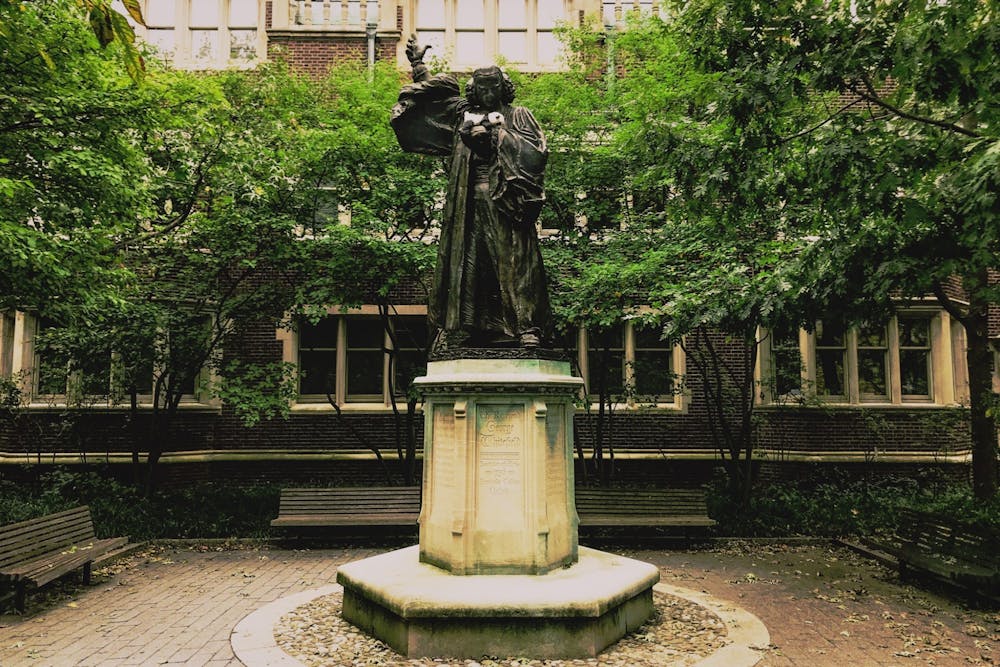The Penn & Slavery Project launched an augmented reality campus tour app that allows users to explore Penn's historical ties to slavery through digital recreations of campus locations, such as the Quad.
The app's six tour stops detail Penn's early funding from enslavers and contributions to scientific racism, as well as the personal and familial histories of University affiliates and graduates who were enslaved. The app, which launched on Feb. 19, aims to dispel the notion that the University has no direct ties to slavery and challenge the way users view Penn and its campus.
For users who are on campus, the app suggests a walking route through the stops, each of which includes a short exhibit with narration and an opportunity to read more on the Penn & Slavery Project website. Users can move their device to explore the augmented reality images and tap on objects to learn more about them.
One stop, located in the Quad, displays the recently removed statue of George Whitefield, an enslaver and advocate for the expansion of slavery in the American colonies. The stop also notes that 10 of the 39 residential halls in the Quad are named after enslavers.
History professor and lead historian for the Penn & Slavery Project Kathleen Brown said the idea for the app emerged in spring 2019, after members of the Penn & Slavery Project began looking to create a website to publicize their research.
Second-year history Ph.D. candidate VanJessica Gladney, one of the original student researchers for the Penn & Slavery Project, said the augmented reality format provided the Penn & Slavery Project with a way to tie its research to Penn’s physical campus while accommodating the University’s resistance to physical installations or plaques..
"I'm really hoping that this app is an introduction for people to this history, and it acts as a beginning to future Penn initiatives that attempt to deal with this history of slavery and the slave trade," second-year history Ph.D. candidate Breanna Moore said.
RELATED:
Penn Museum lecture series explores the treatment of controversial historical monuments
Black Penn students allege pattern of racism in Chemistry dept. on viral Instagram page
Moore, a 2015 College graduate who has conducted research with the Penn & Slavery Project since 2018, narrates the stop on the app called "Generations," located at the Generational Bridge on Locust Walk. In an audio recording, she retraces 200 years of her family history, from her great-great-great-great grandmother, who was enslaved by a Penn graduate, to herself, the first person in her family to attend an Ivy League university.
Moore chose to retell this multigenerational story through a digital recreation of her grandmother's quilt, using augmented reality to include four videos stitching together her family history and its connections to Penn. Moore said that the inclusion of the augmented reality quilt helped tie her research together and convey it to the public.
"It was taking the archival research that I've done, the interviews that I've done with my grandma and other family members, and being able to turn that into something creative and digestible and really short and to the point," Moore said.
Brown said she hopes the app is effective in pushing back against the idea prevalent prior to the Penn & Slavery Project's founding in 2017 that Penn was "all clear" of any past ties to slavery.
In 2006, Penn's University Archivist Mark Lloyd told The Daily Pennsylvanian that Penn's history was untouched by slavery, unlike some of its Ivy League peers. Ten years later, Penn reiterated the statement after a book claimed that all colonial-era universities have connections to slavery.
"There was a belief that Penn was somehow exceptional and that there was no tainted blood money, no money derived from slavery, no slave ownerships," Brown said.
After clicking "Start" on the app, it shows users a quote from Benjamin Franklin: "Half the truth is often a great lie."
Gladney said the Penn & Slavery Project included this quote, in part, as a direct response to the University's 2016 statement, which mentioned that Franklin was an enslaver as a young man before becoming a prominent abolitionist.
Users are also presented with an advisory warning that the app's content may cause users "discomfort and distress." Researchers said they wanted to acknowledge the seriousness and potentially triggering nature of the app's content, particularly for Black users.
Moore said the app offers important framing for all users, as not everyone will relate to the app's content in the same way.
"You have to deal with the discomfort of the present and of the historic in order to move past this discomfort, to get to a place that's comfortable for everybody and just not a few," Moore said.









